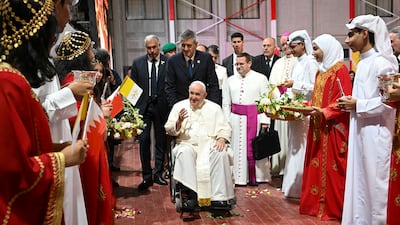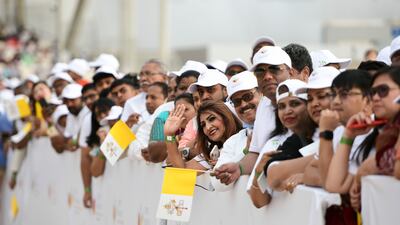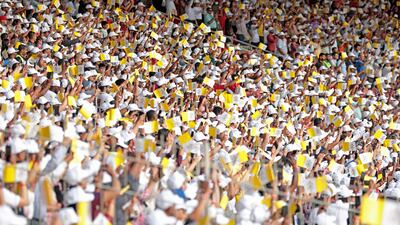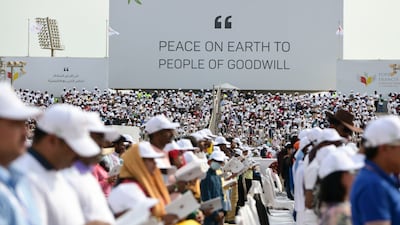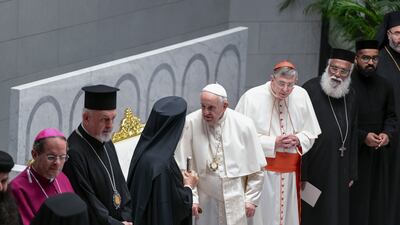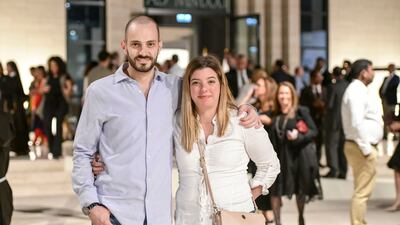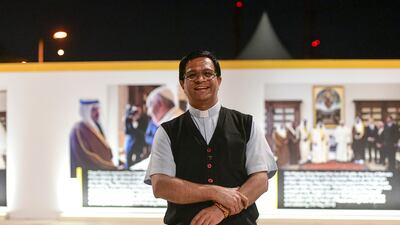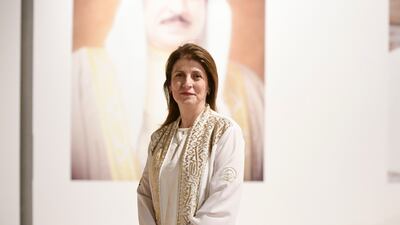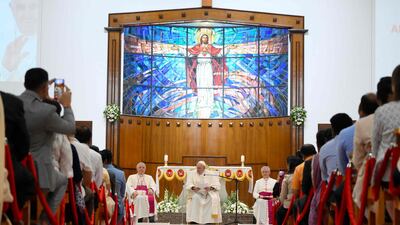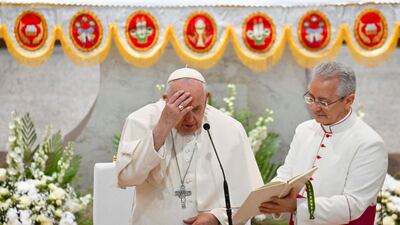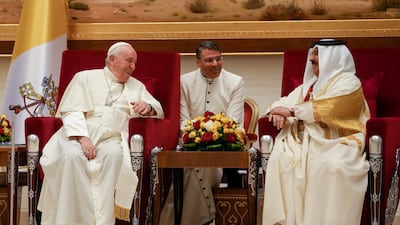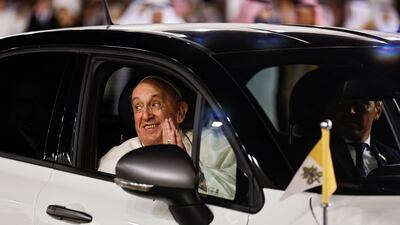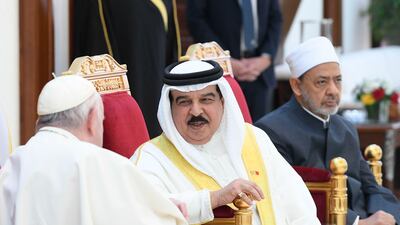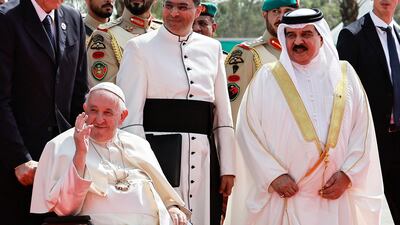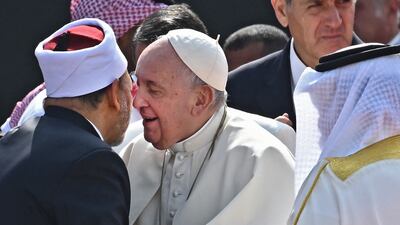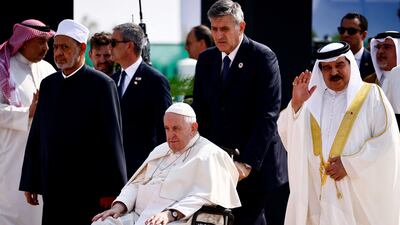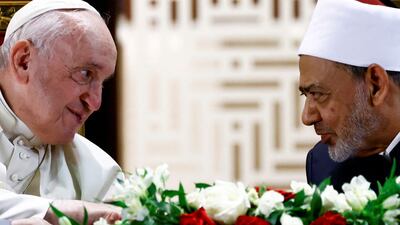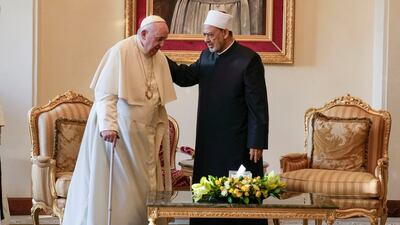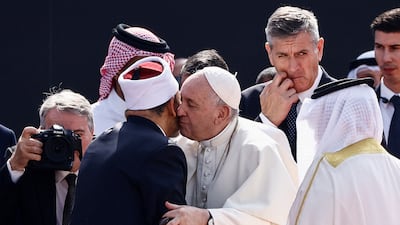In a quiet Bahrain school district, the evening stillness was broken by the noise of pupils cheering to greet Pope Francis during his landmark visit to the Gulf island nation.
Under shining golden stars strung up at the Sacred Heart School in Manama, more than 100 pupils waved flags and reached over red rope barriers to touch the Pope’s hand.
The spontaneity and enthusiasm of the people who gathered for hours to see the Pope was replayed in churches and homes across the country during his four-day visit last week.
His messages of peace, reconciliation, pleas to end war and for dialogue between Islam and Christianity went far beyond the kingdom's borders.
Sweeping national boundaries, it reached Catholics across the Middle East, Europe and Asia who scrolled news websites to listen to his words.
His urgent warnings to stop “playing with fire, missiles and bombs, weapons that bring sorrow and death” and address the “shameful scourge of hunger” struck home.
Emotional salve for the young
Teenagers from different faiths listened intently as the Pope spoke animatedly in Italian and his speeches were translated into English.
His words of support were like an emotional salve when he said he understood the challenges and complexities that adolescents face.
It was the Pope’s voice they had tuned into during the coronavirus pandemic through social media posts.
Seeing him in person gave many the strength to move forward.
“Since the pandemic, everyone has been so down with studies and life but with this meeting he has helped us to go ahead with our lives and motivated me to do more in future,” said Viyana Viju, 16, a pupil in Grade 10.
“He is my Pope, he gives advice like a father.
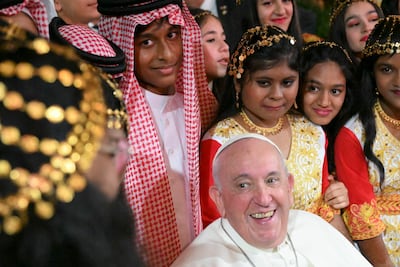
“We are at this age when we feel sad and lonely, we feel pressure, we lose confidence in ourselves and feel down.
“But he said the reality is that we don’t have to do it alone, that our parents and friends are there for us.
“He said we youth should never lose courage, dream big, that they needed our creativity and our smile.
“This made me want to change my perspective of life and do more.”
The Pope met with royals, ministers and diplomats and sought to further strengthen the bonds between two of the world’s major religions.
But it was the 85-year-old Pope’s direct connection with the public that was most striking in Bahrain.
There were magical moments for the young and old when Pope Francis, seated in a wheelchair, gave a thumbs-up sign to the crowd, clapped for them and moved his arms in time to the music when he spotted young dancers who had performed for him.
Turn the other cheek
The leader of the world's 1.3 billion Catholics lives up to his title “pontiff”, which means bridge builder.
This was only the second time that a Pope has visited the Gulf, three years after his historic visit to Abu Dhabi.
Bahraini banker Jamil Ghattas, 51, attended several papal events from November 3 to 6.
He was present when tumultuous shouts broke out when the Popemobile slowly drove into the Bahrain National Stadium as Pope Francis blessed babies and waved to 28,000 people gathered from the Gulf and overseas.
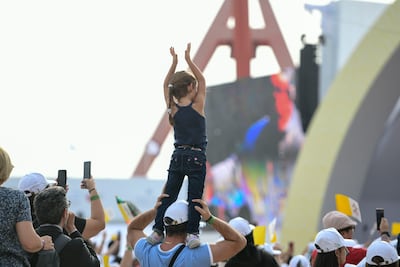
“He is not a saint or a prophet but I’m a great believer in him because I respect him,” said Mr Ghattas who has lived in Bahrain since his Palestinian Catholic parents made it their home more than 50 years ago.
“He concentrates on youth and we need that because today we are a crossroads.
“We face social and political problems, we enter wars while this man of peace is asking religions to unite.
“He has extended his hand to countries to open dialogue as he wants to bring humans together.”
Mr Ghattas was stirred by the Pope’s messages to practice a life of harmony and break the spiral of violence.
During the homily at the stadium, the Pope spoke about the power of love and urged the faithful to go beyond the boundaries of family and nation to accept foreigners and those who hold other beliefs.
The doctrine of turning the other cheek resonated with Mr Ghattas.
“The message he is delivering is not that you should keep getting slapped but he is telling us to forgive,” he said.
“His tour of our region is very important because he speaks of living together and accepting your neighbour.
“This is the choice everyone must make.”
The people’s Pope
When the Pope spoke at the Sacred Heart Church, the oldest in the region, and the Lady of Arabia Cathedral, the largest in the Gulf, his lessons were relayed beyond those who bowed their head in prayer before him.
It has been a momentous time for the 80,000 Catholics in Bahrain, but Pope Francis’s voice also reached thousands more in other nations.
The Argentinian pontiff is regarded as the “people’s Pope” for his ability to connect with the sick, elderly, children and immigrants, perhaps more than any predecessor.
Even after Pope John Paul II made him cardinal in 2001, he continued to live in a small Buenos Aires flat and insisted on travelling by subway and bus.

He was caring for people in the city's slums when Pope Benedict XVI retired from the papacy and he was named the 266th pope of the Roman Catholic Church in 2013.
This enduring link with the less fortunate encourages an active Catholic global community to track his work.
From her home in Mumbai, Farida Farias, 74, has been forwarding news stories from Bahrain daily to hundreds of family and friends in India, the US and the UAE.
“People are so happy with the welcome he got in a Muslim country and that there was an incredible inter-religious atmosphere,” said the grandmother.
“It is fantastic that he made the trip being 80-plus and with all his health issues.
“He is so clearly connected to the poor and this shows from his foundation of being a priest, bishop and then pope.
“His travels to non-Christian countries to promote the message of peace and goodwill — that is something people will not forget.”
Fighting a culture of secrecy
The Pope has been criticised for not doing enough to act on the church’s darkest crisis, holding priests accountable for sexually abusing children they swore to protect.
There have been protests against a culture of secrecy with calls for transparency on reporting abuse and action taken.
Pope Francis denounced the “ugly habit” of covering up sexual abuse in the family, community and church, during an in-flight press conference when returning to Rome.
He spoke of the will of the church to change and said more cases would likely be brought to light.
Teenagers like Ms Viju wholeheartedly support openness in handling cases of abuse.
“Victims need someone they can rely on and trust. There should be counsellors in churches and schools so people who suffer abuse can be open,” she said.
“A victim feels like they are nothing, they feel ashamed. When the Pope speaks about it, people will understand it is OK to talk openly.”
